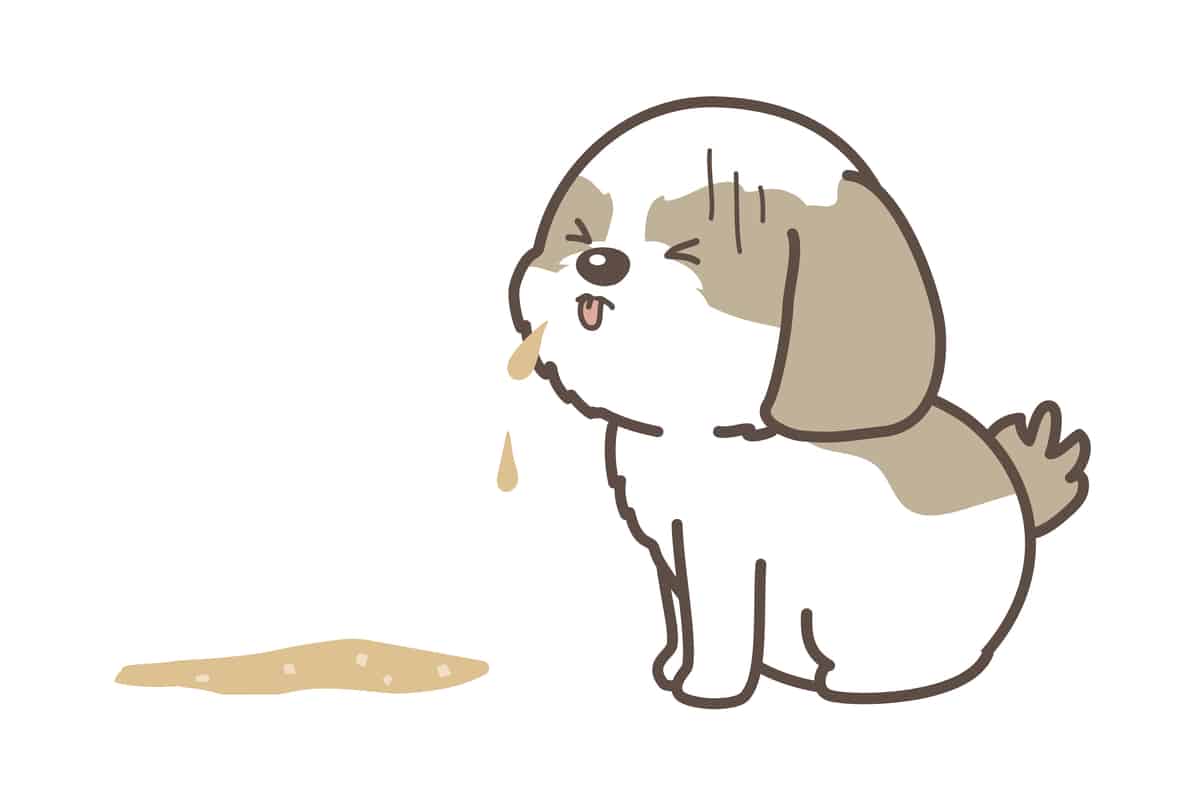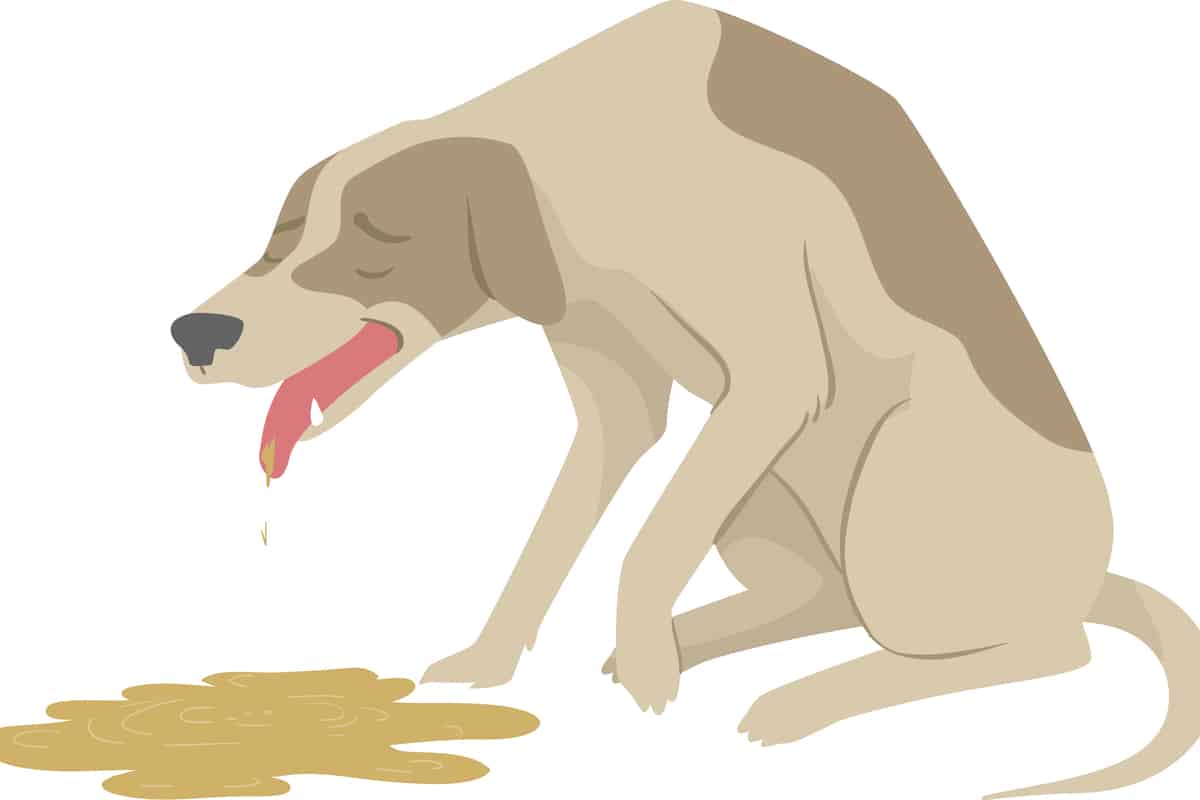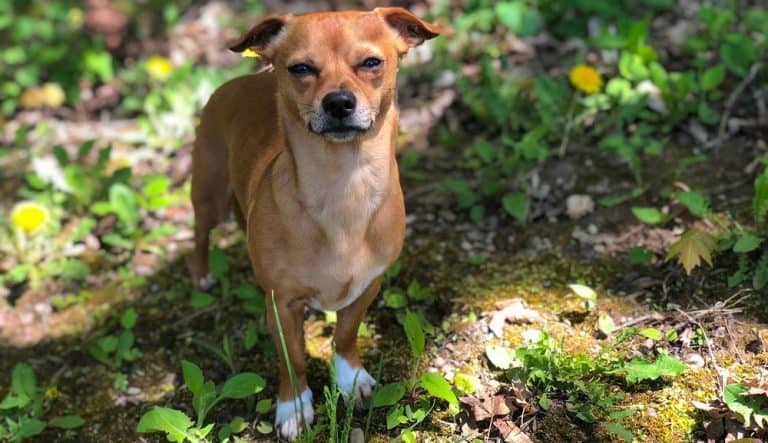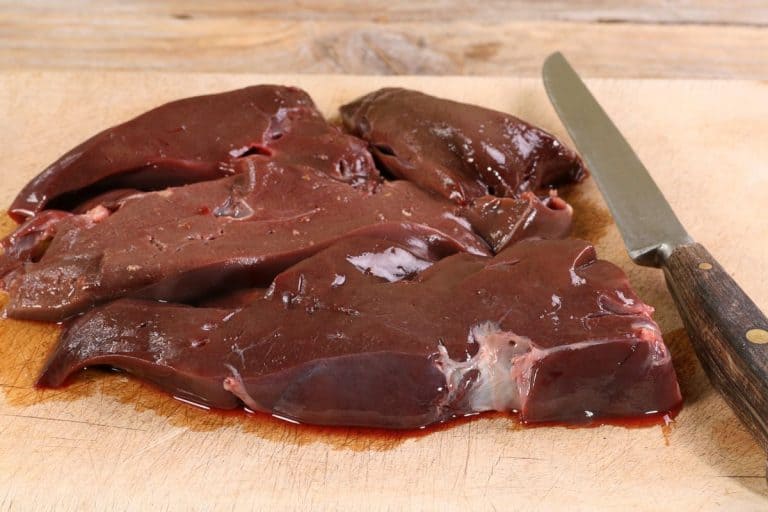Why Is My Dog Throwing Up Undigested Food Hours After Eating?
Dogs are known to have vomiting periods sometimes, therefore, you shouldn’t be worried every time your dog is sick. However, sometimes there is cause for concern, if you see your dog throwing up undigested food after they have eaten.
In this article, we will be uncovering why your dog is throwing up undigested food hours after eating. With a couple of treatments that you can try to use on your dog to help relieve their sickness.
The Difference Between Regurgitation And Vomiting
It isn’t pleasant to see anybody throwing up, but it can be extremely unnerving to see your dog throwing up. However, if you notice your dog is throwing up undigested food just after they have eaten.
Then the chances are that your dog may be regurgitating their food they have just eaten, rather than vomiting.
As a result, it is important that you learn and get a good understanding of the difference between regurgitation and vomiting, so that you can take the right course of action.
Regurgitation
Regurgitation is the process of your dog passively bringing up undigested food. Thus, your dog will typically lower their head and passively cough the food they had just eaten out.
The food will easily come out, almost in the same state as it was eaten. Generally, there will be no sign of a warning from your dog that they are about to regurgitate their food.
Alongside this, the food will still be undigested as it never reaches the stomach in the first place. However, it may have a much more tubular or cylindrical shape, due to being passed through the esophagus.
Also, the food will be surrounded in a slimy mucus that from the esophagus as well. This mucus is what helps your dog to bring the food up so easily.
Henceforth, you can tell that your dog has regurgitated their food, as it looks almost the same as it was when they ate it. In some cases, your dog will re-eat their regurgitated food, as it never reached their stomach. It may also still be appetizing to your dog in this new state.
Vomiting
Compared to when your dog is vomiting. They will generally act a bit strange and begin to drool more than normal. You will notice the muscles in your dog will begin to contact, and you will see their whole body tense up.
Another common sign that your dog is vomiting is that you will see or hear your dog retching. What they bring can be undigested and partially digested food. There will also be a clear liquid if the food has been brought up from the stomach.
Or you will see a green liquid, and this is if the food has come from the small intestines. Your dog will be uncomfortable, and their stomach is known to make loud whining and gurgling sounds.
It can be difficult to tell the difference between if your dog is vomiting or regurgitating. In some cases, a dog can vomit quite quickly after they have eaten. Yet there are cases when a dog is known to regurgitate hours or days after they have eaten.
If you are unsure which of the two is happening to your dog. Then the best thing to do is take a sample to your vet for them to examine. An experienced vet will be able to give you the answer just by looking at the sample straight away.
However, if they are unsure, they can run a simple pH test to get a clear answer. It is known that the pH for vomit containing food is very acidic. Compared to the pH for regurgitated food, which is a lot higher up on the pH scale.
Why Is Your Dog Throwing Up Undigested Food After Eating?

We have now done through the différance between your dog throwing up and regurgitating their food. As we now know the difference, we can look into why your dog may vomit up their food after eating.
As we have mentioned above, regurgitation can happen either straight after your dog has eaten, or it can take a couple of hours. The same can be said for vomiting as well.
It can either happen straight after your dog has eaten, or they could start throwing up several hours after.
As a result, we need to discuss why your dog could vomit or regurgitate straight after eating.
Regurgitation
Your dog may regurgitate their food straight after eating, due to many reasons. These could be the following:
- Too excited.
- They have eaten their food way too quickly.
- Your dog could have a tumor or have a certain kind of nervous system problem.
- Their esophagus may be inflamed or have narrowed for another reason.
- There could be bad bacteria or foreign bodies in your dog’s esophagus.
- Your dog may suffer from megaesophagus, which is a condition that makes your dog’s esophagus dilate. This then causes pushing food down to the stomach a lot more difficult.
- There are certain breeds of dog that are much more prone to regurgitate their food than others. These dog breeds include: Miniature Schnauzer; Wire Fox Terrier; Great Dane; Shar-Pei; Newfoundland; German Shepherds; and Labradors.
Vomiting
Just like with regurgitation, there are many reasons why your dog may be throwing up, straight after eating their food. These reasons include:
If your dog eats their food too fast, like with humans, it can cause indigestion. Typically, it is only a mild form of indigestion, but then can cause your dog to vomit.
You may decide to try to give your dog something new that they haven’t had before in their diet. This can lead to gastrointestinal intolerance (GI), which can then lead to your dog to vomit. This will happen when your dog’s body doesn’t properly process the food they have eaten as they aren’t used to it.
Or your dog could have a certain food intolerance, like humans, thus their body will try to remove it from their body quickly.
Giving your dog bad food or something that is inedible, then their digestive tract will refuse to break that food down. Then it won’t get absorbed into their body, which means it will need to be removed from the body, normally through throwing it back up.
Sometimes, if your dog eats something that is very solid, like a bone or a stone. This can then block the digestive tract and will immediately begin to throw up to clear the digestive tract. As this item will stop any digestion getting in place.
You must let yourself have time to let their food digest properly before they take part in any physical activity. So, if your dog takes part in any training or running after eating, then they are very likely to throw up.
Why Is Your Dog Vomiting Hours After Eating Their Food?
On average, it takes your dog around 2 to 3 hours to properly digest and empty their stomach. Ideally, it should never take longer than 4 to 5 hours.
As a result, if your dog is still throwing up food that has not been digested after 6 to 8 hours, then there is something wrong.
There is a very high chance that maybe they have a GI issue, which is causing a delay in their stomach emptying their contents into their intestines.
Just as we did above, there are different reasons why your dog may be throwing up their food several hours after eating, and the reasons are different for vomiting and regurgitation.
Regurgitation
Your dog might be regurgitating food several hours after eating for a couple of reasons. These reasons are quite similar, as we have mentioned above. It can be due to excitement, tumors, inflammation, anxiety, stress, megaesophagus or eating their food too fast.
Alongside inflammation of the esophagus and megaesophagus. There are some other esophagus related issues that can cause your dog to regurgitate your food several hours after eating.
These related issues can be esophageal achalasia, myasthenia gravis and cricopharyngeal.
Vomiting
If your dog is vomiting up undigested food after 8 hours after eating, then there are a couple of reasons for this.
Your dog may have eaten something that is blocking something. This blockage is preventing their food from passing through their body normally and easily.
If your dog is experiencing blockage issues, then this can lead to a couple of symptoms. This can cause vomiting, defecating issues, diarrhea and abdominal pain.
Some of the common culprits that can cause a blockage is if your dog eats stones, rubber balls, sticks, hair and any other foreign objects that your dog shouldn’t be consuming.
However, your dog may just naturally have a sensitive stomach. Therefore, if they eat something that disagrees with their stomach, this leads to your dog vomiting several hours later.
Also like with regurgitation if your dog is dealing with too much stress, excitement, or anxiety that can cause your dog to vomit their food up several hours later. Although, your dog could also be experiencing pancreatitis, which is due to ingesting fatty foods.
What happens is that the emptying of your dog’s stomach into the GI tract is slowed down. Pancreatitis can cause other symptoms like a fever, loss of appreciation and even stomach pains for your dog.
Another reason why your dog may be vomiting several hours after eating is they may suffer with Inflammatory Bowel Disease (IBS).
Certain dogs that suffer with this condition are known to throw up several hours after they have eaten. This can vary and depends on the area of your dog’s GI that has been affected. Sometimes vomiting is followed by diarrhea.
Dogs can suffer with motion sickness, which can cause them to throw up several hours after they have eaten. Yet sometimes, as we have seen, vomiting several hours after eating, can be a sign of an illness and disease in your dog.
Diseases like diabetes, ulcers, cancer, infections, or roundworms can cause vomiting in your dog. So can if your dog is eating things that they shouldn’t be.
Even if it isn’t garbage, your dogs should avoid consuming garlic, chocolate, and onions which can cause vomiting.
Why Is Your Puppy Throwing Up Several Hours After They Have Eaten?
When an adult is seen throwing up after they have eaten or several hours later, it isn’t uncommon. Typically, you need to just wait and see and the case of throwing up is normally very mild.
However, if you notice your puppy throwing up several hours after they have eaten, this could be serious. This is because a puppy has a small GI tract, and their immune system is still developing. As a result, they can lose vital electrolytes and dehydration extremely quickly.
As a result, when you notice your puppy throwing up, you need to act quickly. You need to discover why your puppy is throwing up so that you can help them. The reason a puppy may be vomiting isn’t too dissimilar to why an adult dog may be throwing up.
This can be caused by your puppy eating something they weren’t supposed to, swallowing any kind of dangerous object, food allergies, stress, anxiety, eating too much fat or poisonous substances.
Apart from all the causes we have mentioned above, puppies are known to develop infectious vomiting. For example, if your puppy begins to throw up, then it can be a sign that your puppy is suffering with a canine distemper virus. This is more prone if they hadn’t had all of their vaccinations.
Both of these diseases can cause a lot of vomiting. Which can then cause other health issues that are quite serious. This can include dehydration and intestinal problems, all of which can lead to death if not properly treated.
Alongside that, puppies are very at risk to developing intestinal parasites and worms, which can always cause diarrhea and vomiting. For certain deep chested dogs, regurgitation, or even vomiting is a sign that they are bloated.
Finally, some other causes of your puppy vomiting after they have eaten includes the following:
- Adrenal gland diseases,
- Kidney Issues,
- Addison’s Disease,
- GI ulcers,
- Anatomic abnormalities,
- IBS,
- Heat Stroke.
Why Is Your Dog Throwing Up Food At Night?

Particular dog breeds are more prone to vomiting up partially digested food at night. Thus, they are throwing up food that was eaten several hours before, but will mostly vomit at night.
If your puppy or dog is doing this, then you should be aware that this is a sign of reverse motility. At night, when your dog is laying down for the majority of the time. This is then making the digestion process much more difficult.
Hence, the contents that are still in the stomach are refluxing. This can lead to your dog’s esophagus getting irritated, which then leads to your dog throwing up at night.
When Should You Be Concerned?
You don’t have to be concerned every time your dog throws up, if it’s only once in a while. However, you should keep an eye on it, as vomiting is a sign that is associated with serious or life-threatening illnesses and conditions. These diseases may require your dog to seek emergency treatment or care.
Below, we have put together some signs of when you should be concerned about your dog vomiting:
Frequency
If your dog continues to throw up for a long time, then this is a sign that something a lot more serious is going on. It could be a sign that your dog is suffering from kidney failure, IBS or stomach ulcers
Blood In Vomit
You may notice blood in your dog’s vomit, or they are vomiting up objects that look like coffee bean grounds. If you see this, then you must get in contact with your vet immediately.
As blood is seen in your dog’s vomit, then this is a sign that something a lot more serious is going on.
Other Symptoms
Your dog may have other symptoms apart from sickness. These could be sneezing, diarrhea, drooling, loss of appropriate or seizures. If you notice any of these, then you know that something is wrong with your dog, and you must speak with your vet.
Behavior Changes
Noticing changes in behavior such as sleeping a lot more than they usually do, weakness, pain when you touch their abdomen or loss of weight after your dog has thrown up are all things you should note. Then speak to your vet as something more serious may be occurring.
Treatments
You now know why your dog may be throwing up their food after eating or hours later. However, there are a few things you can do to help your dog to help them make them feel better.
Withholding Their Food
After your dog has thrown up, withholding giving your dog any food for a couple of hours. This is to give their digestive system and GI tract enough time to rest and even repair itself.
However, you must make sure that your dog is well hydrated, so give them plenty of water. Otherwise, your dog may become dehydrated if you are dealing with a severe case.
Sometimes withholding water and fluids can make sure that nothing else comes back up out of your dog. However, you do risk causing your dog to become dehydrated. Always talk to your vet before you consider withholding food and/or water from your dog.
Alongside this, try to keep your dog as calm as possible. To help them get through the situation, so they don’t become stressed and cause more vomiting.
Diet Change
Not all dog food breeds agree with your dog’s stomach. Also, if you feed your dog foods that don’t agree with them, this can cause other health issues and inflammation of the GI tract.
If you believe that your dog’s food is causing this issue, then you may want to consider changing the commercial food that you are feeding them. However, you want to make sure that the ingredients are different.
You want to keep your dog’s food as simple as you can, so that you aren’t making the issue worse. Try to make the change gradually over a week to 10 days.
Bland And Small Diet
Once your dogs have been treated and their sickness has stopped, you may want to give them a bland diet. This will involve giving your dog low fat food in smaller amounts, around 3 t o 6 times a day.
A lot of experts actually recommend well cooked chicken and white rice is the perfect meal to feed your dog. Over time, you can slowly begin to increase how much food you give them and decrease how often you are feeding your dog.
Then, once their vomiting has settled, you can slowly put your dog back onto their typically every day diet.
Light Dog Food
If you think your dog has motility problems and that is the reason behind their sickness, then you may want to start giving your dog a light formula for food.
Also, giving your dogs a high fiber dog food can help improve their motility over time. Yet, a lot of dog owners have also said that feeding their dogs plain pumpkins can have significant improvements.
Slow Your Dog Down While Eating
You may have come to the conclusion that your dog is vomiting or regurgitating their food because they are eating it way too quickly.
To make them slow down while they are eating them, you want to consider purchasing a puzzle feeder. This will force your dog to eat much more slowly, as they have to work out how they can reach the food.
Also, if you own more than one dog, then consider your dogs in separate rooms. This then avoid s your dogs trying to compete with each other to eat their food first.
For certain larger dogs, it can hurt their back to eat their food from the floor. This can then lead to digestion issues and then this increases the risk of your dog regurgitating their food. If you have a larger dog than you may want to consider feeding them raised bowls.
Beware Feeding Your Dog Bones
If you like to feed your dog bones, then you must make sure that you offer them the right size of bone. Also, you should avoid giving your dog raw hides, cooked bones or edible chew toys.
All of these are awful for your dog and basically chew toys that contain dyes, chemicals, and preservatives that will hurt your dog’s stomach and cause issues.
Add A Probiotic
You may want to add some probiotics to your dog’s diet. These will calm your dog’s stomach down while also helping the function of their digestive system. They also help to supervise a healthy gut for your dog as well.
Try Ginger
Ginger is known to have antiemetic effects. This means ginger is known to be able to block the receptors of serotonin. These are things that can induce sickness.
Therefore, by adding ginger to your dog’s diet, it can help to help their stomach down and avoid vomiting.
Moisten Your Kibble
It is known that if you feed your dog dry kibble, that can cause vomiting. This is due to the dry kibble absorbing all the moisture it finds in your dog’s stomach.
Then the kibble will expand and this can then lead to regurgitation. You will know if dry kibble is a problem, as your dog will vomit up the kibble whole.
As a result, before you feed your dog, try soaking the kibble in warm water, only for a couple of minutes. You don’t have to use water, you could use a bone broth to add even more nutrients to the kibble.
No Eating Garbage Or Leftovers
You want to avoid your dog eating anything that they shouldn’t be. As a result, when your dog is outside playing, you should watch them carefully to make sure they aren’t eating anything they shouldn’t. Try to keep any hazards well out of reach.
Alongside this, try to wash your dog’s food bowl regularly to avoid any bacteria or germs growing on it. Then keep their water bowl well full, so they always give access to water when they need it to avoid dehydration.
Seek A Vet
If you are concerned for any reason, then you should get in contact with your vet. They will be able to find out the cause of your dogs vomiting episodes and give you potential treatments and advice to reduce it occurring again.
The majority of vert will ask you to come into the surgery for an emergency visit, or they will ask you to pay close attention to your dog for the next couple of hours.
This is so you can monitor the situation and if the situation gets worse than you will be asked to bring them in.
You know and understand your dog better than anyone else. Therefore, if you are concerned about your dog throwing up, then you should get in contact with your vet as soon as you can.
Important Things To Remember

Even a healthy dog can throw up a couple of times and then go about the rest of their day, as if nothing had happened. If your dog isn’t showing any other symptoms, then they should be fine. However, just keep an eye on them to be safe.
Although, if you notice your dog is throwing up several times in one day. Also, if you notice blood or the vomit is followed by fever, lethargy, diarrhea, pain etc. then you must take your dog to the vet immediately.
As your dog could be experiencing an ulster, inflammatory bowel disease or another serious health concern. Also, if your dog loses their appreciation or sleeping more than usual after vomiting is a concern as well.
If your dog is vomiting a lot, then it can lead to a lot of health concerns and deficiencies if not treated immediately. Constant vomiting can cause dehydration and even electrolyte imbalances which can cause weaknesses, tremors and neurological issues.
After vomiting, your dog may be really thirsty, you should try to limit how much your dog drinks and eats after throwing up. They should only be drinking and eating in small amounts, as that allows their stomach time to settle and repair itself.
By allowing your dog to drink large quantities, this could make the situation worse, and it could cause more vomiting. That’s why it’s best to limit them for a short period.
The main thing you should try to do, if this vomiting keeps occurring, is to find the root of the issue. Once you find out what is causing this vomiting, then you should remove it from your dog’s diet as soon as possible.
Sometimes, if your dog has swallowed something they shouldn’t have then you may be advised to induce vomiting, however you should always seek medical advice through your vet first.
Typically, your vet will give you hydrogen peroxide to give your dog, but always do this with your vet’s guidance if it is necessary.
Final Thoughts
As you can see, there are several reasons why your dog may be throwing up or regurgitating food, either straight after eating or a couple of hours later.
As we have mentioned above, you now know the difference between your dog vomiting and regurgitating their food, as there is a difference.
There are a lot of causes and ways to help treat your dog that may be suffering. If it happens once, then you don’t need to worry.
However, if your dog continues to throw up then you should seek out medical advice from your vet as soon as possible, as it can be a sign of something much more serious occurring.
There may be other symptoms to watch out for as well that go hand in hand with your dog vomiting.
Always keep an eye on your dog if you notice them throwing up after they have eaten. If you aren’t happy then seek help as soon as possible.






